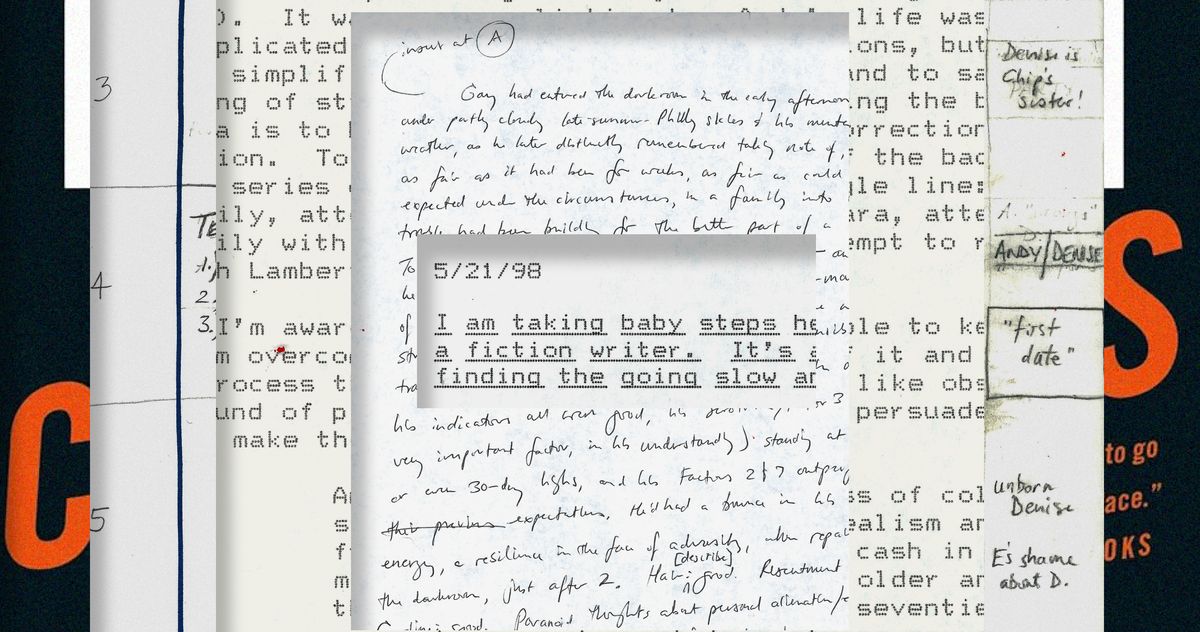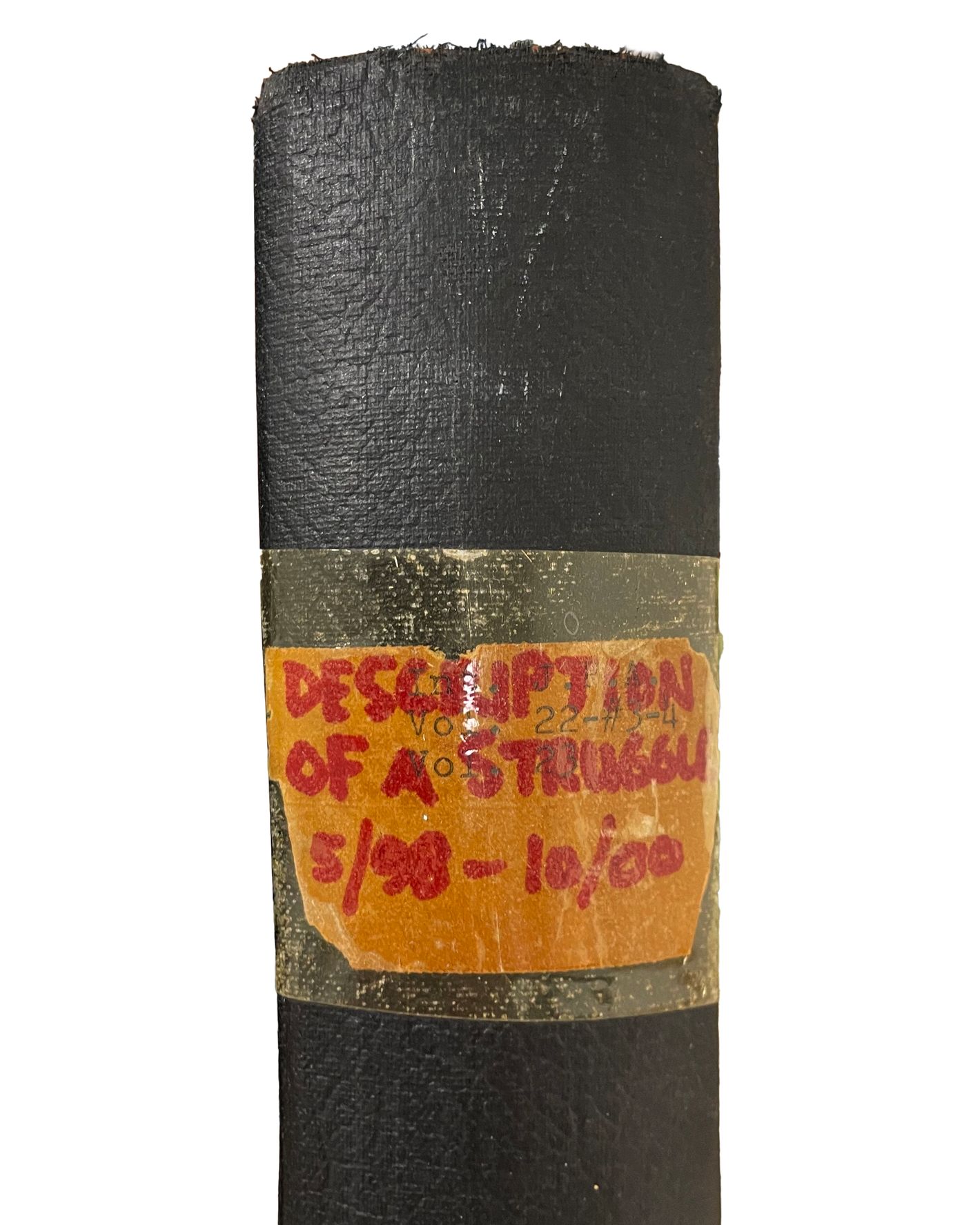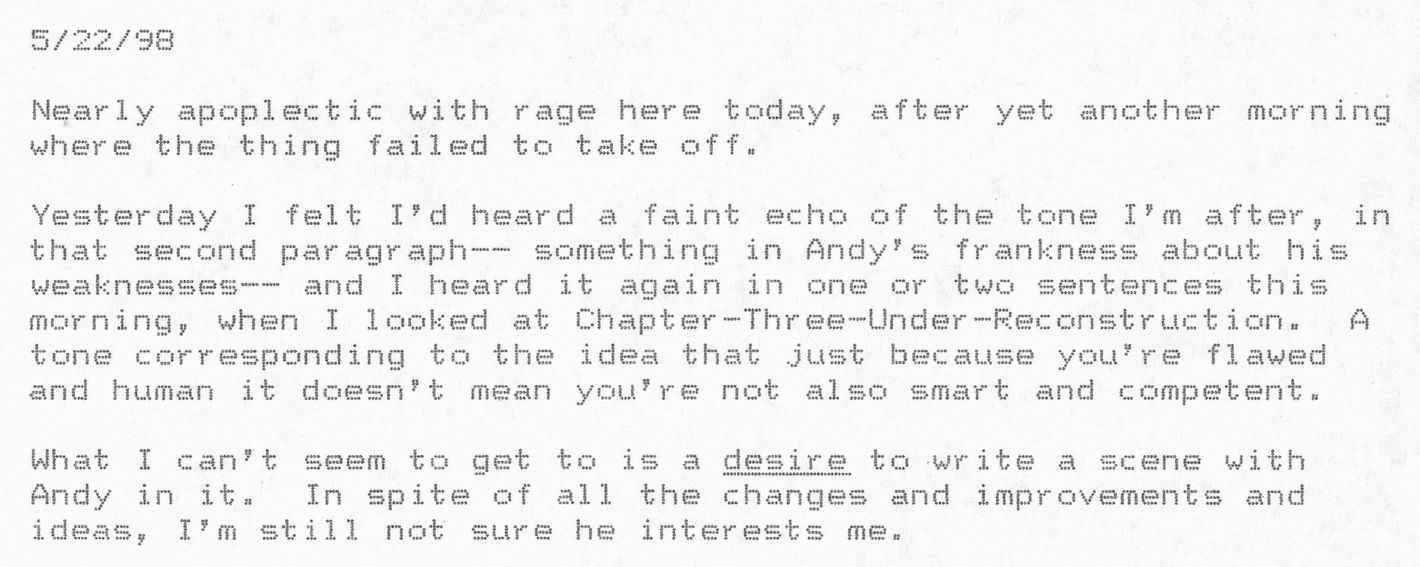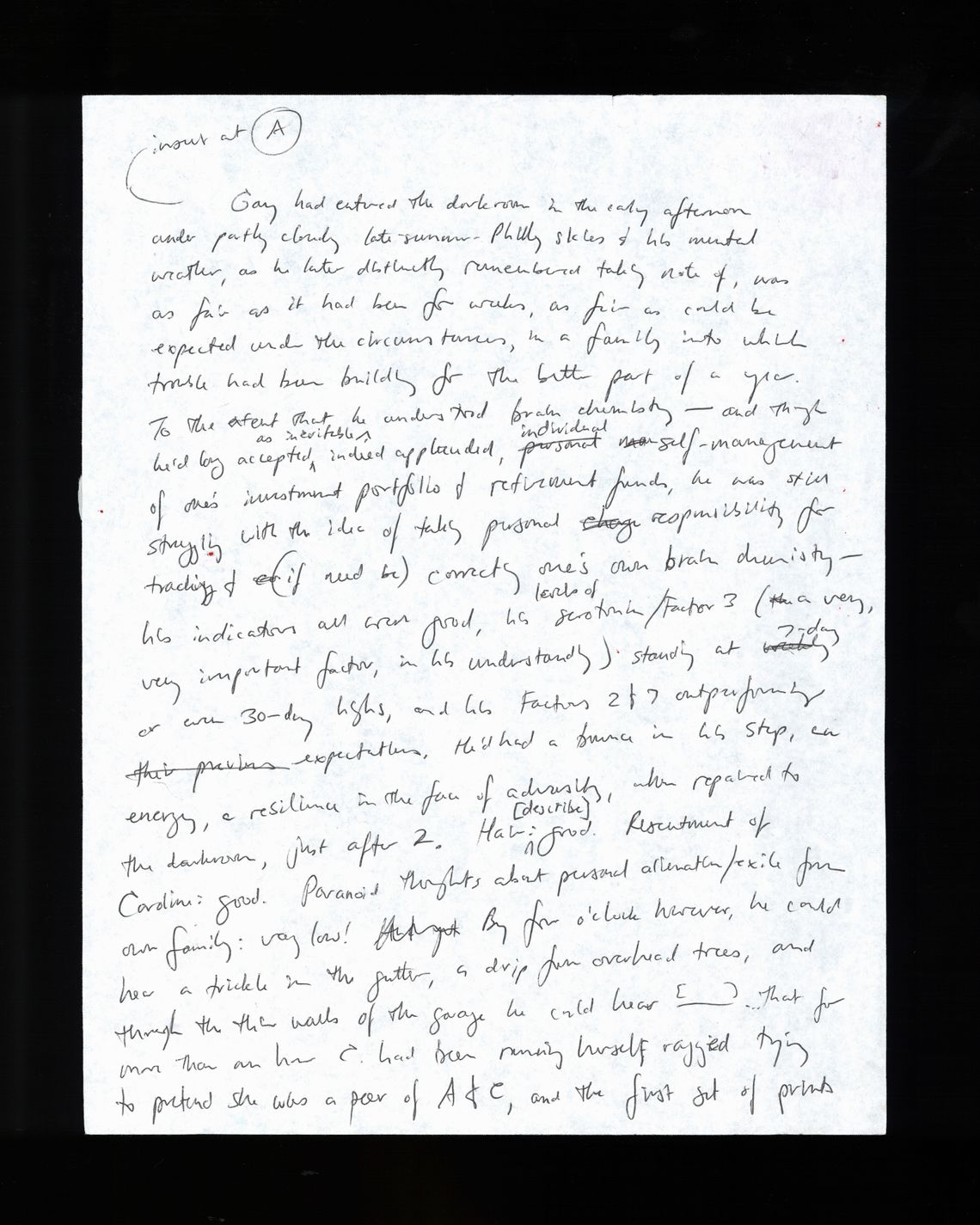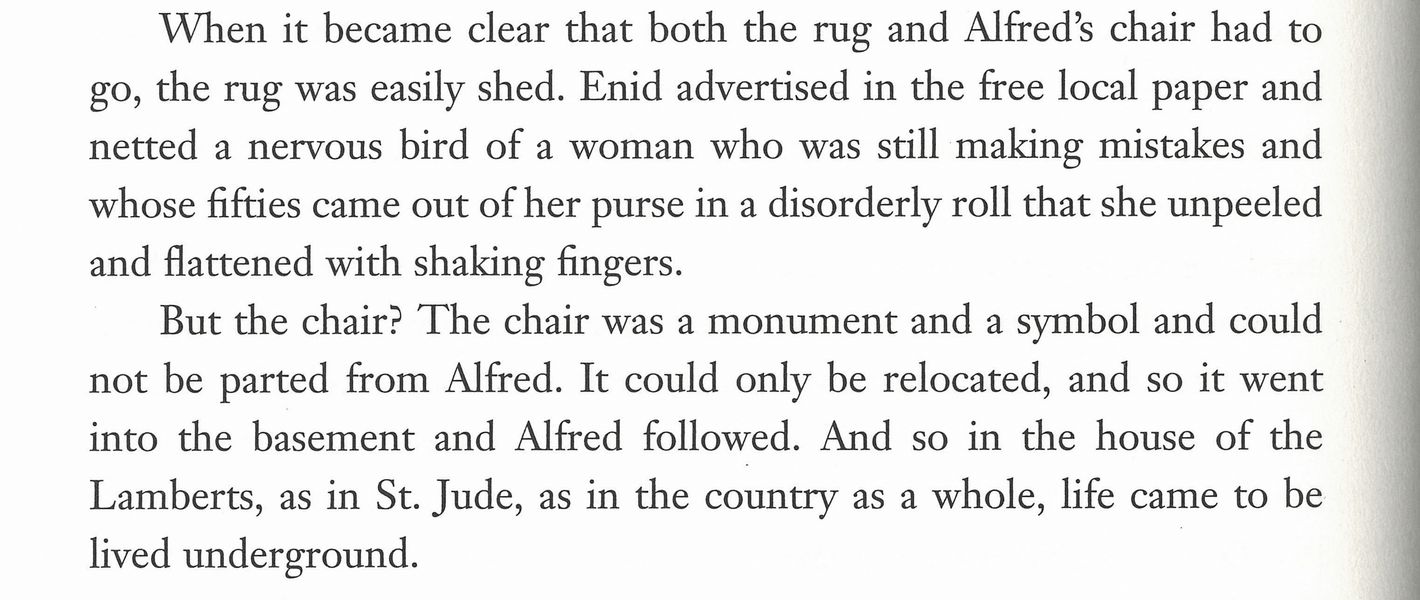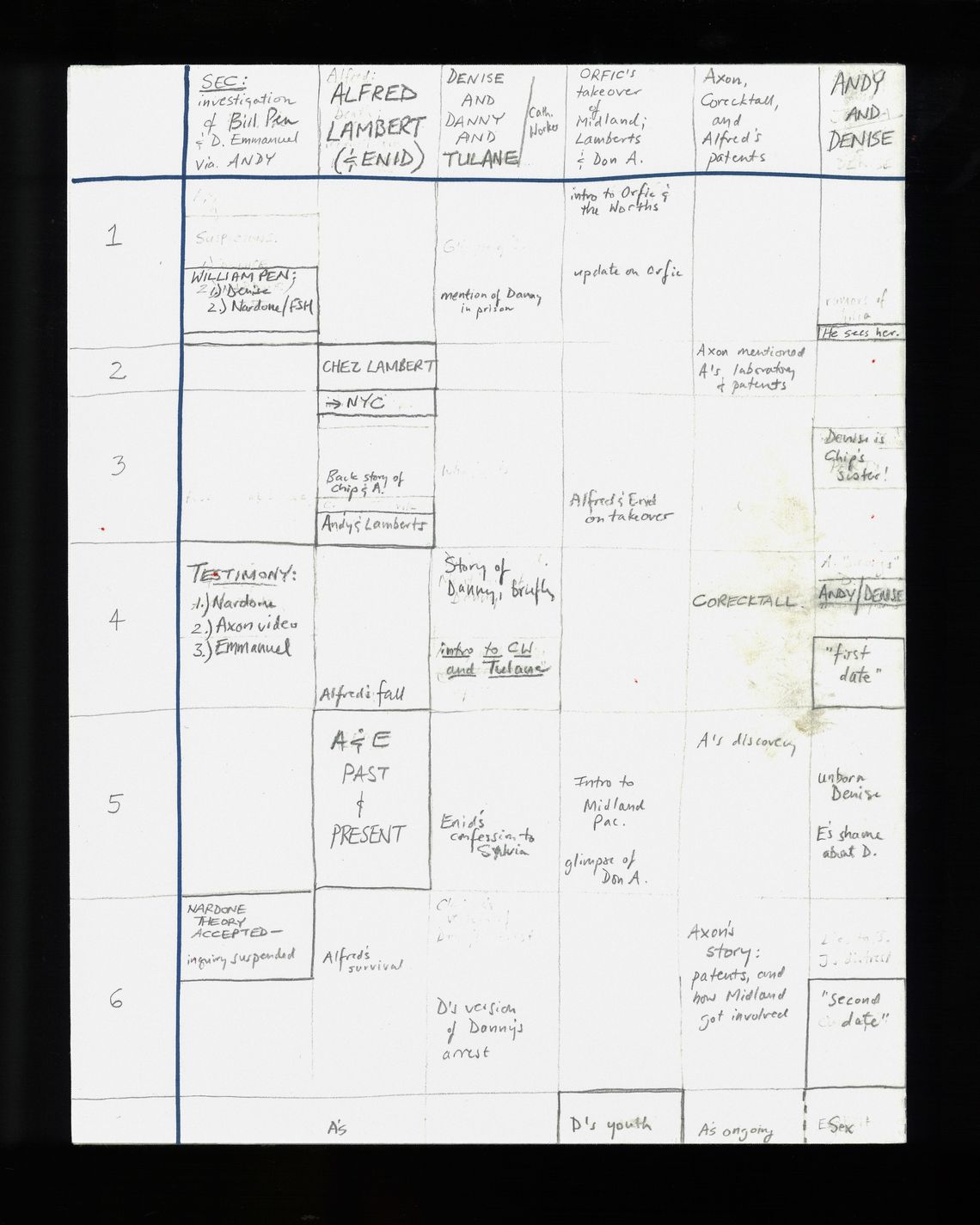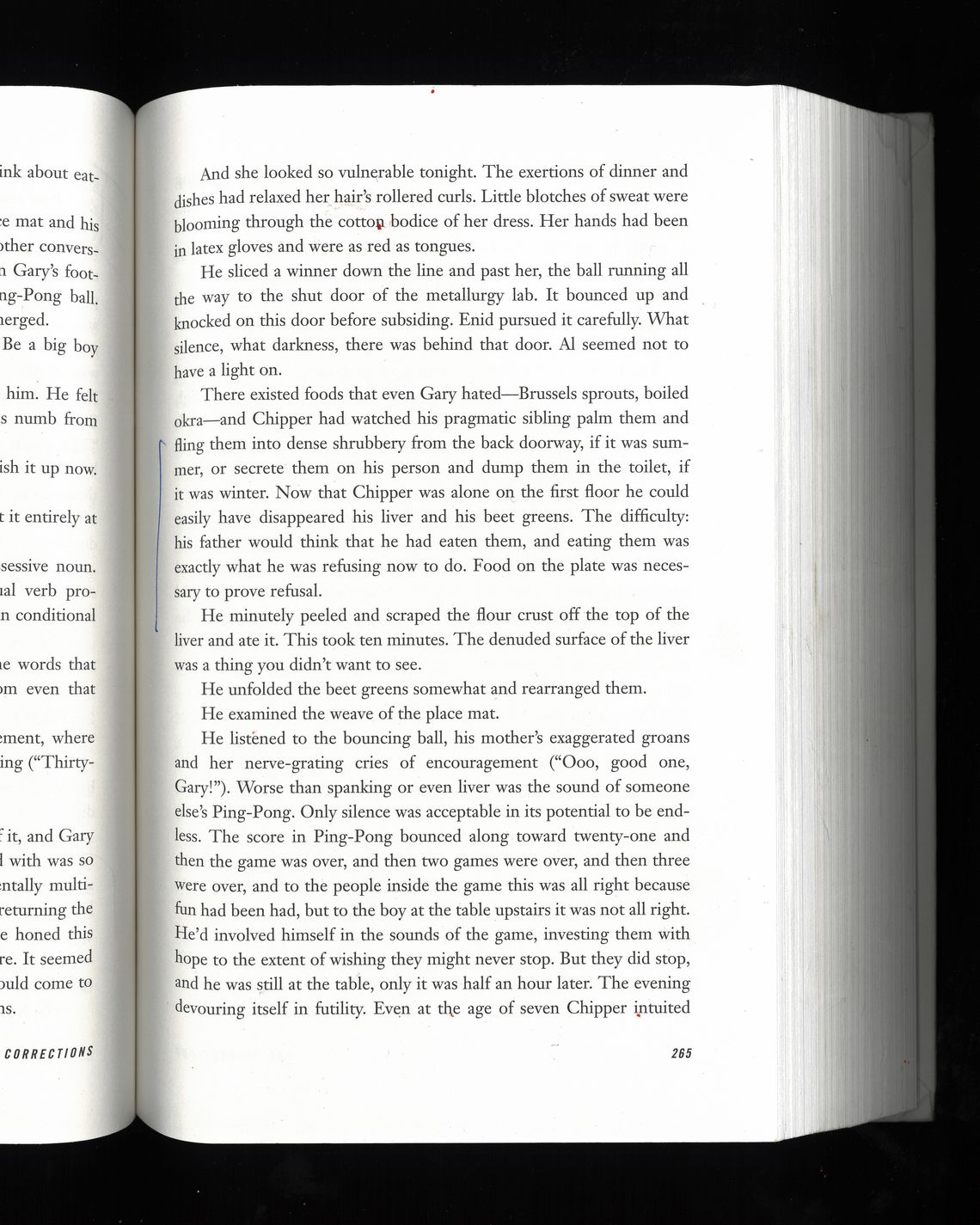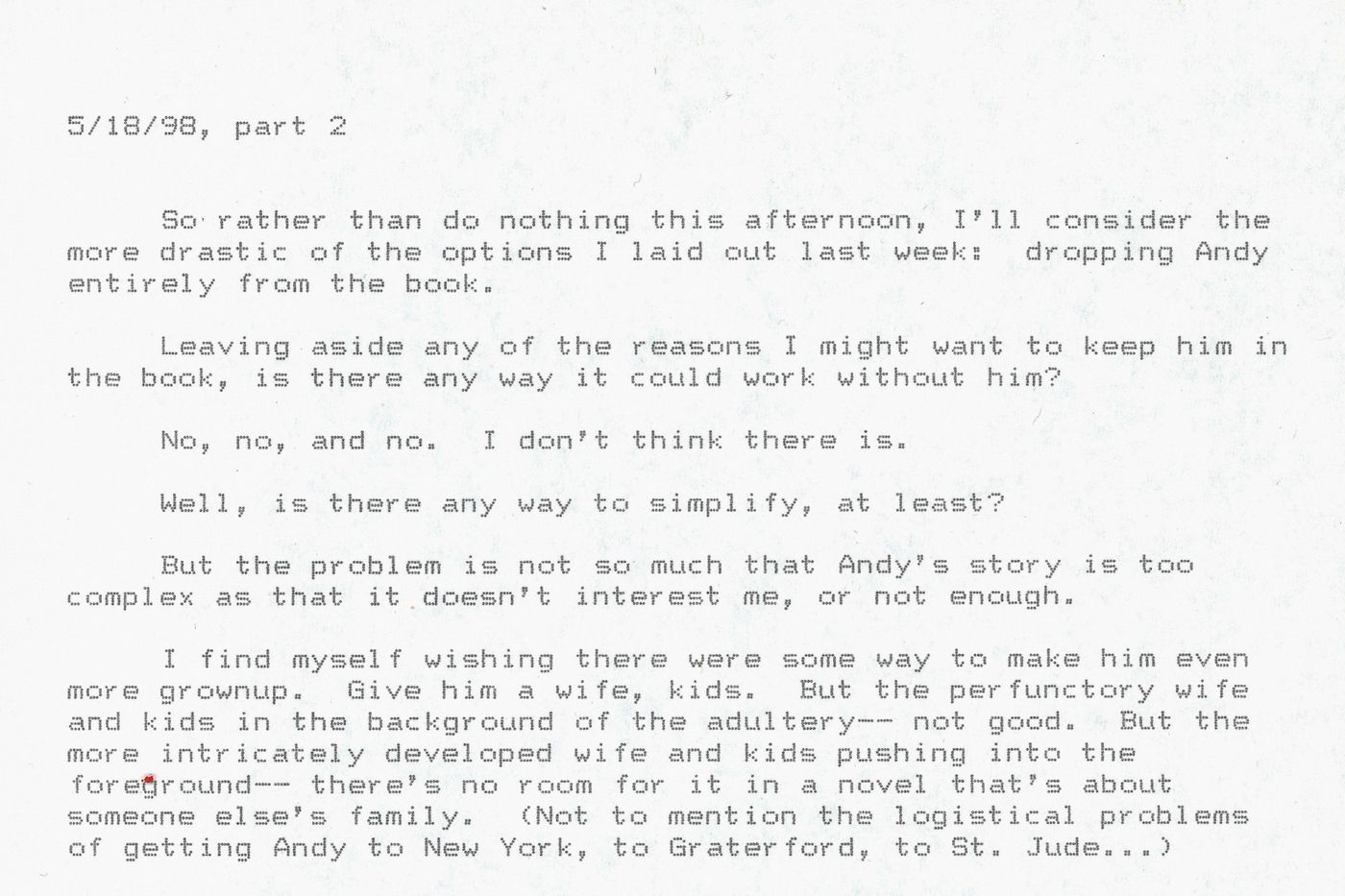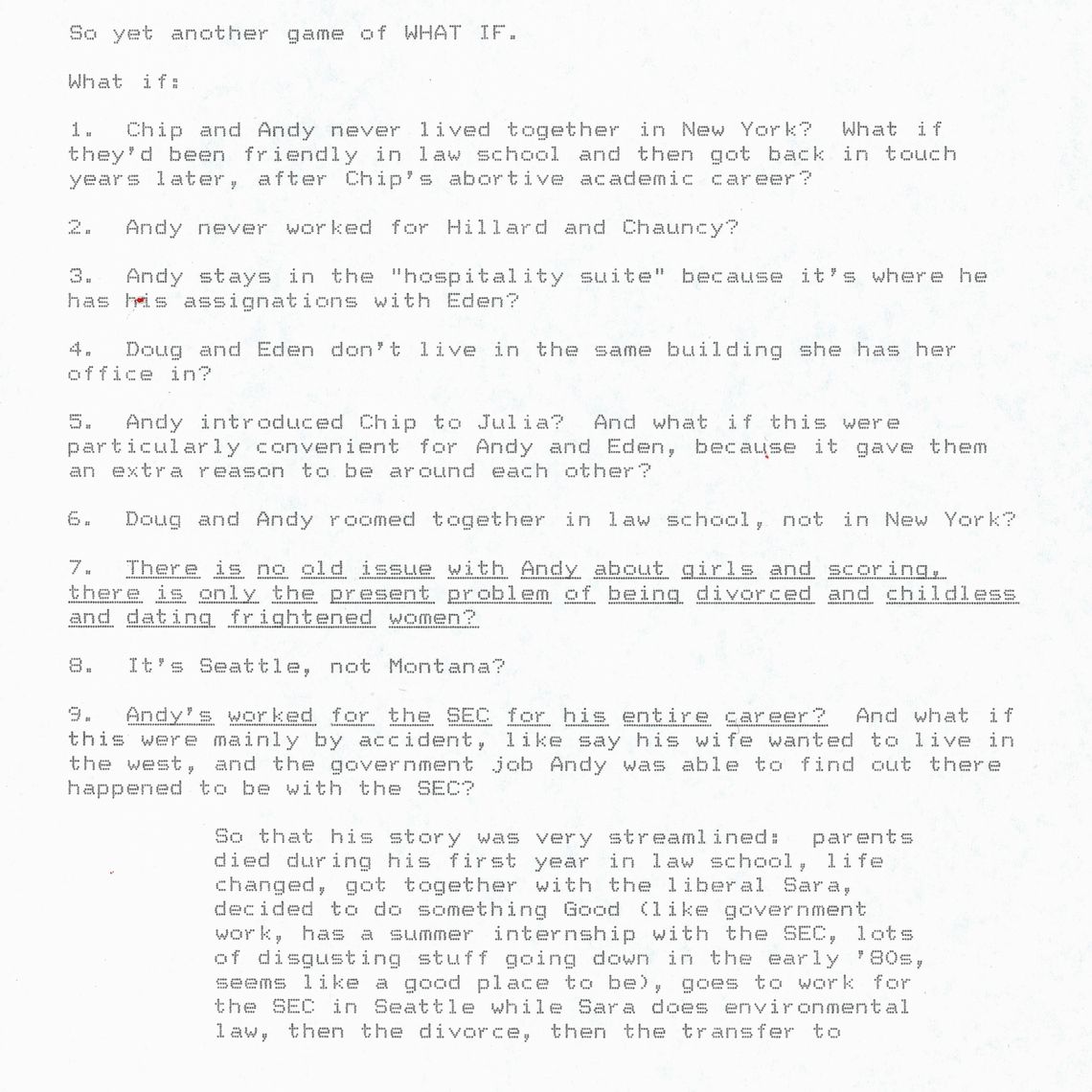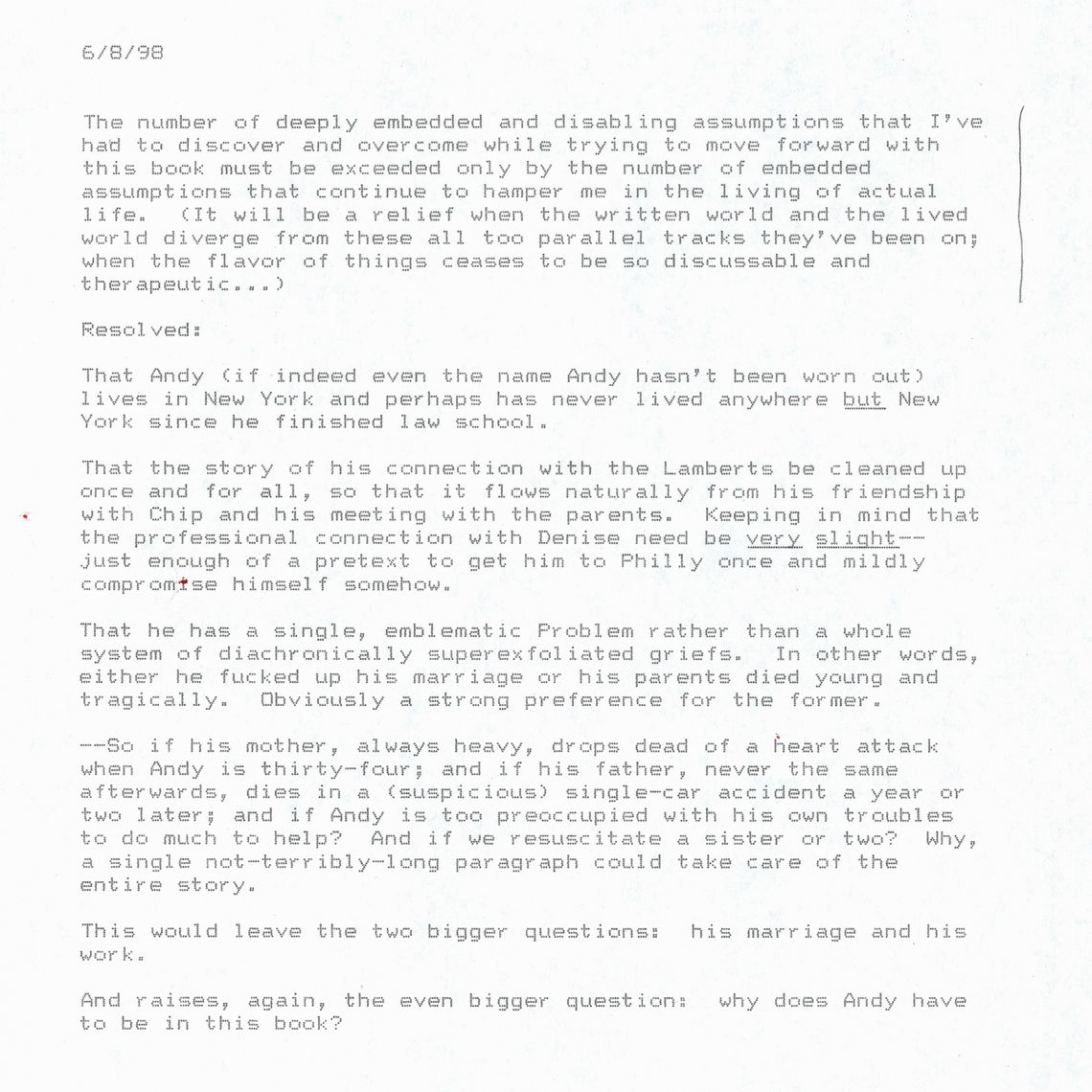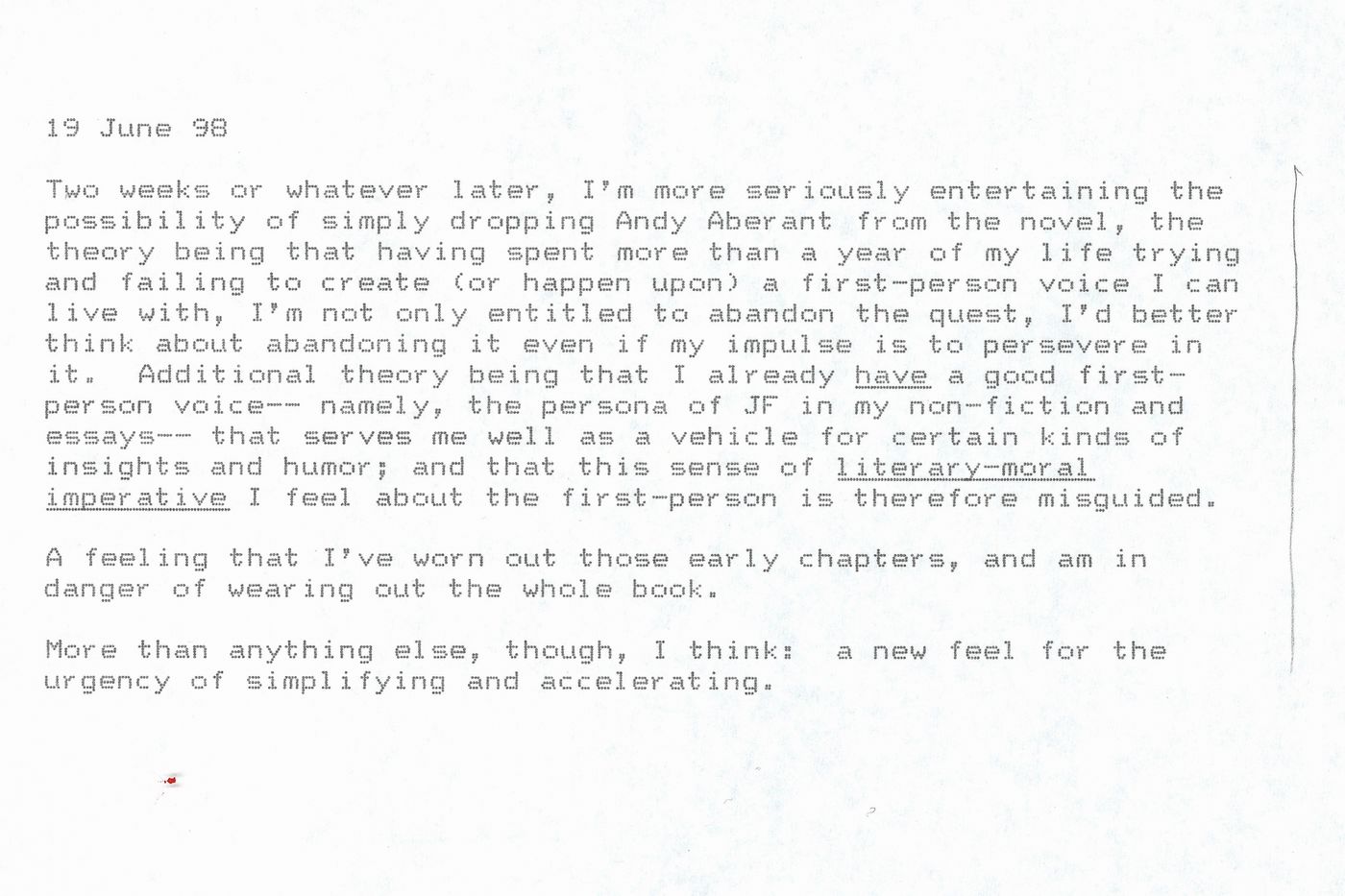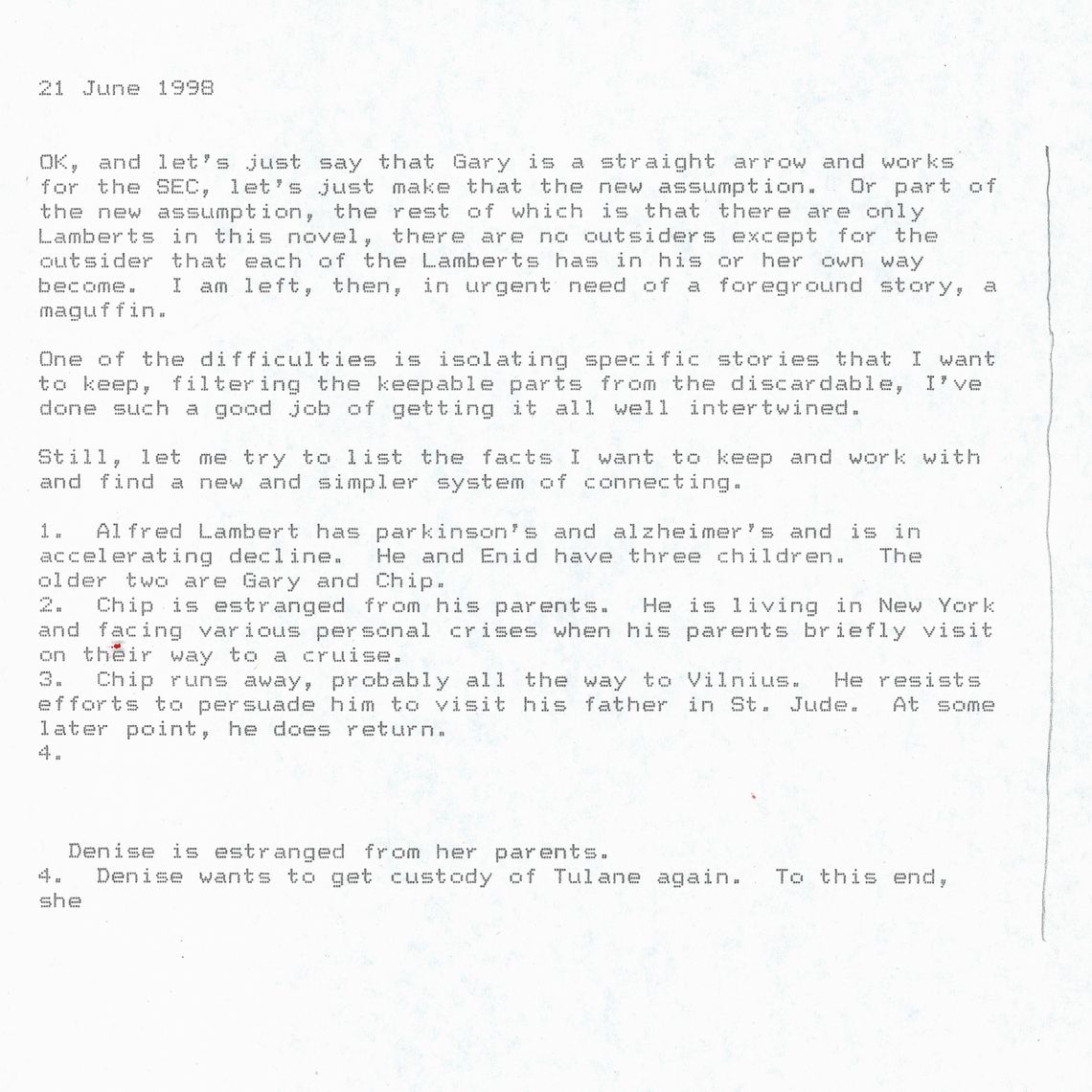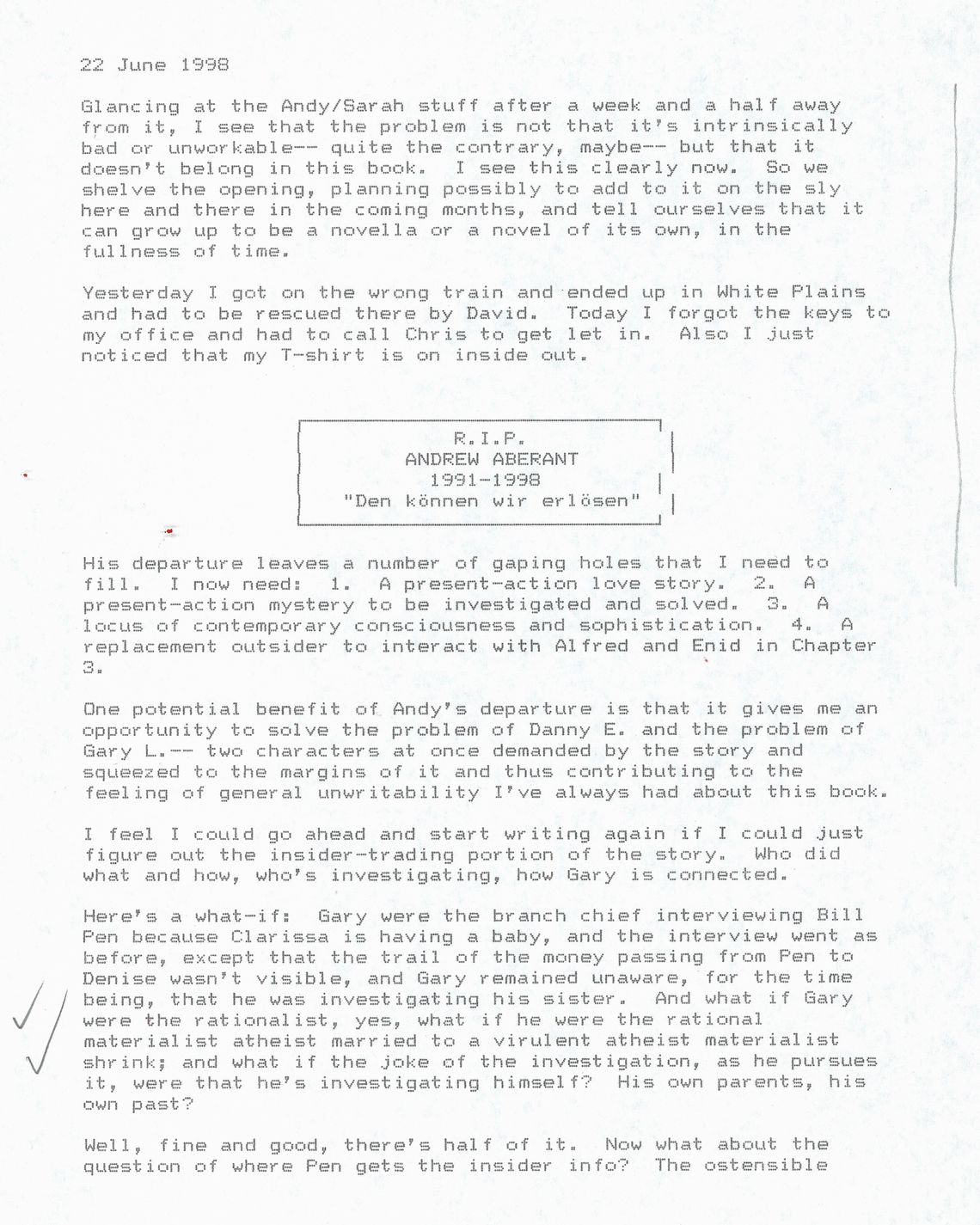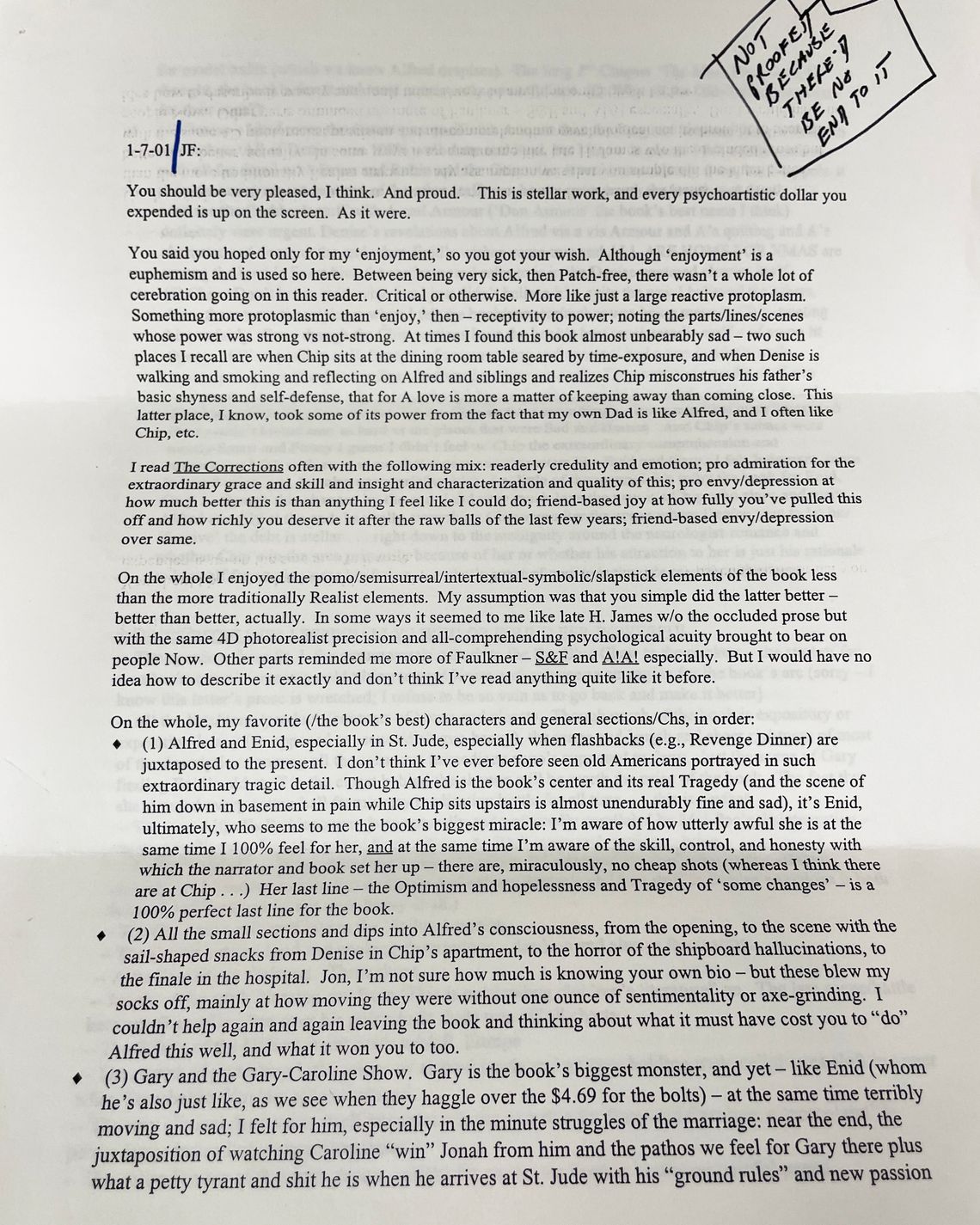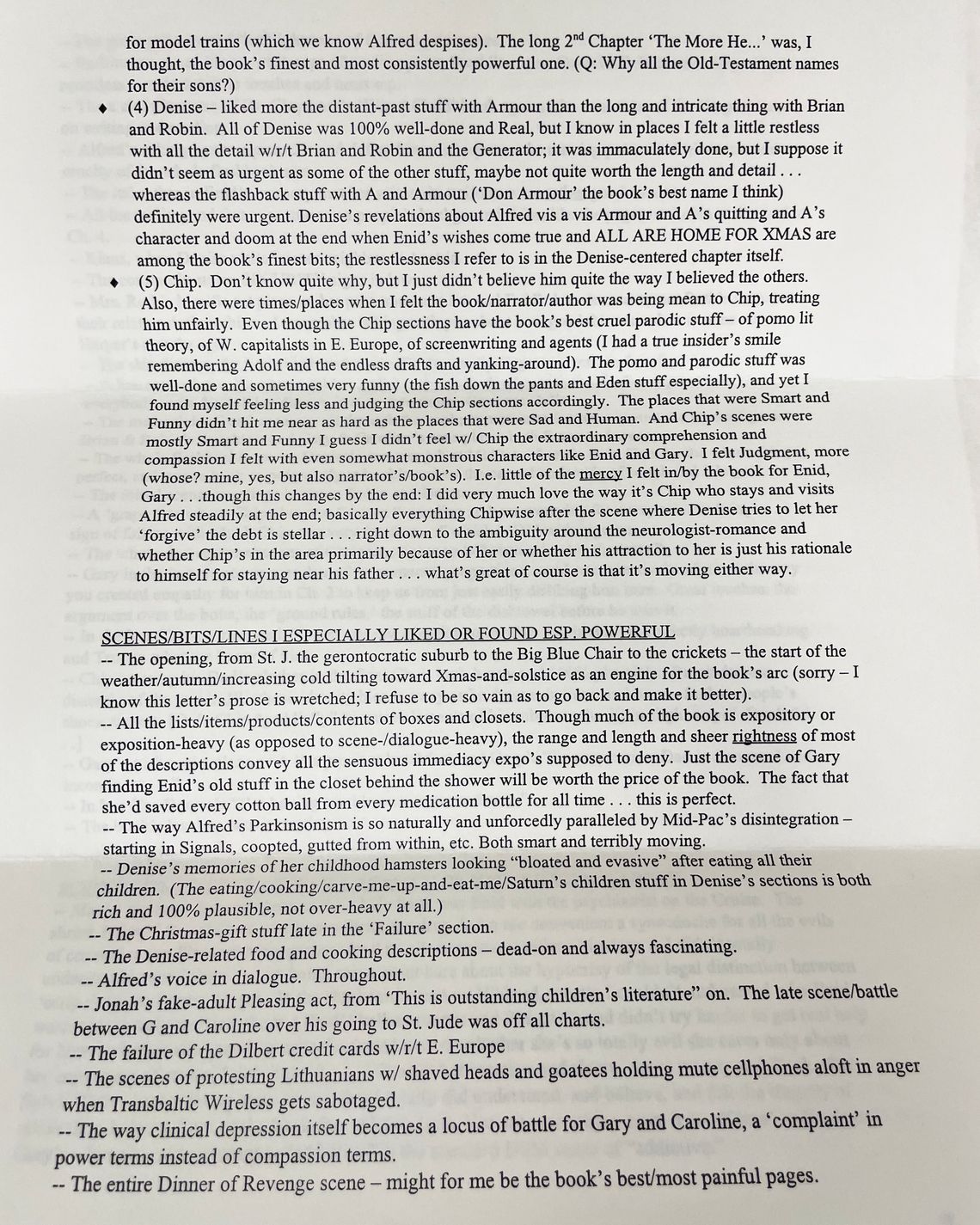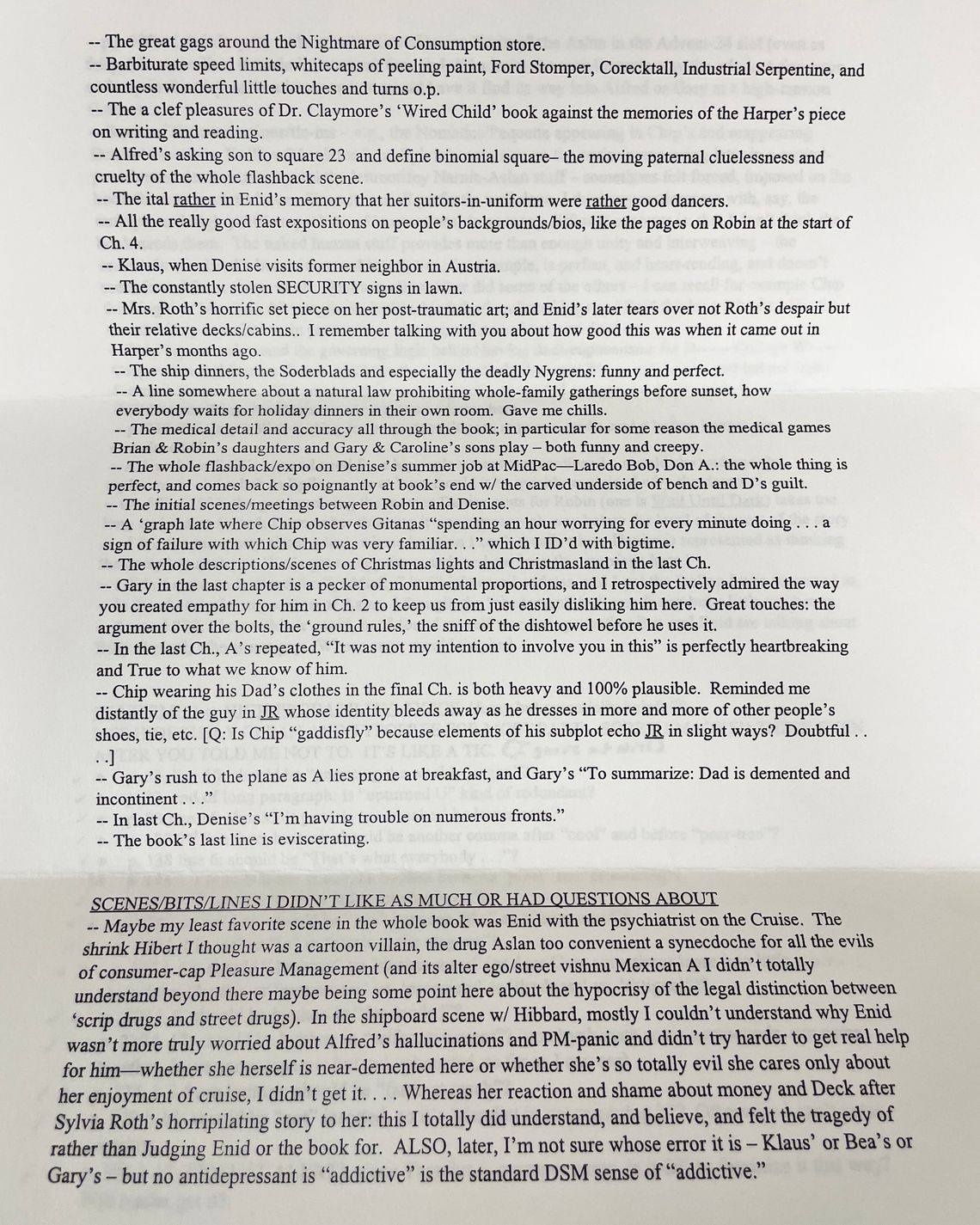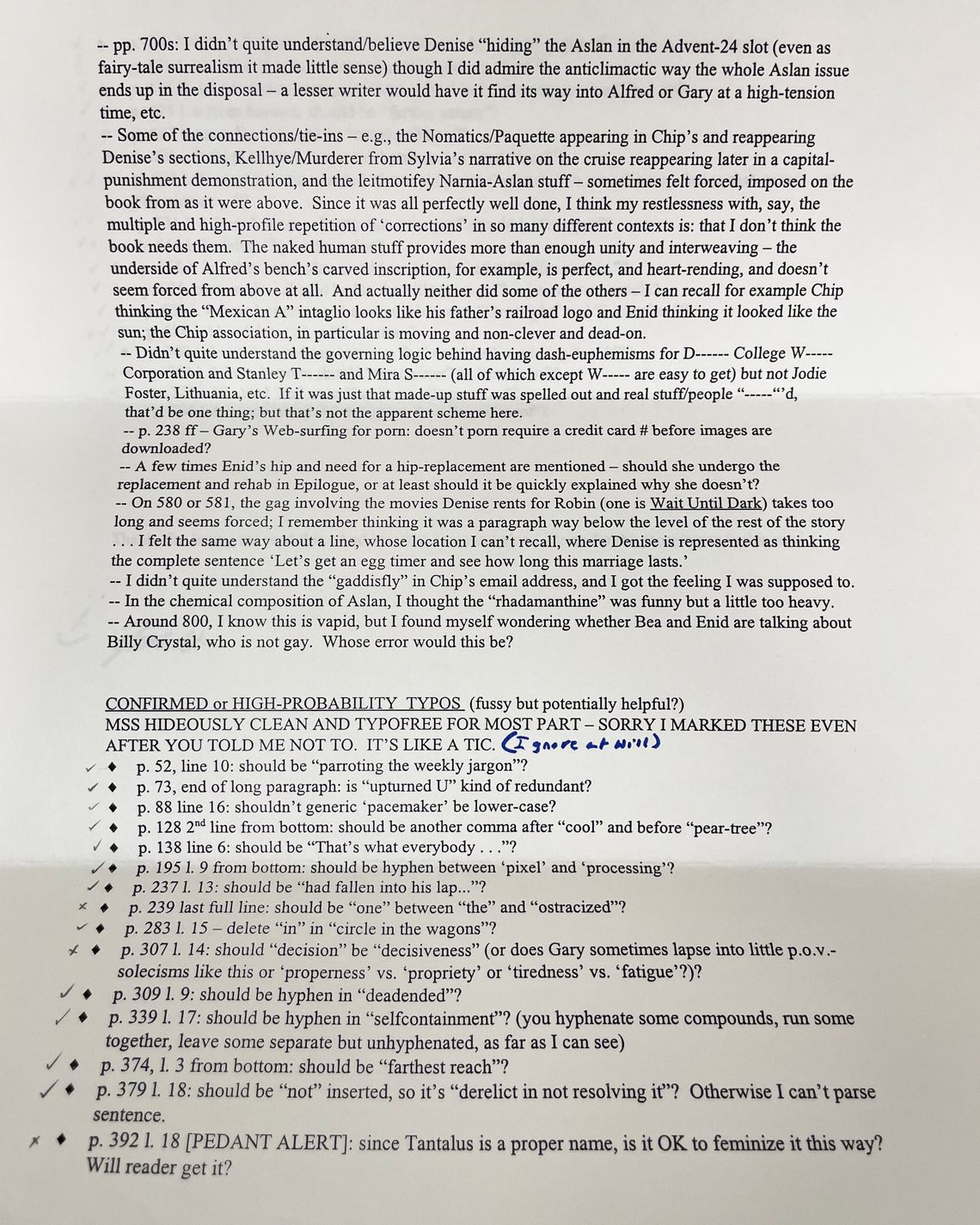Photo-Illustration: New York Magazine
This article was featured in One Great Story, New York’s reading recommendation newsletter. Sign up here to get it nightly.
“Here it is: Description of a Struggle.”
Jonathan Franzen hands me a journal he’s found in a bin, a record of his day-to-day entries from the summer of 1998. We are in a storage annex next to his office, which is Spartan. There’s a small desk, a guitar on a stand. The curtains are drawn — he writes in the dim light; he even wrote, famously for a time, blindfolded. The writing studio is adjacent to the house he has built in Santa Cruz, California, overlooking a protected ravine.
We’ve spent the last few hours talking about the struggle that the journal documents, the writing of the novel The Corrections. The Corrections is much loved, by me and countless others. It was the book that taught Franzen how to write the novels that have made him that rare literary writer who is a best seller; that required a willful dramatic turn from his first two books; that featured a scorching battle with his own psyche; and that, as a consequence, was an almost decadelong agony to write.
The journal is full of notes-to-self that provide a real-time map of what was going through his mind. Franzen writes intimately about his bleeding in entries he’s kept …
… which he allowed me to share. It’s rare for a writer to allow you this far in to see how a novel is written; most are secretive, superstitious about exposing a creative process that even they don’t understand.
But Franzen seems to thrive on introspection. He holds himself to ridiculous standards — the first thing you notice when talking to him is how self-flogging he is — or at least did in this account. He’s also unusually ambitious. All writers who can finish a novel are ambitious, but from the very beginning Franzen aspired not just to write a book (which is difficult enough) but to be a writer who mattered, to achieve the stature he in fact now has. He’s very open about that. And about feeling deeply competitive with other writers in a way reminiscent of the rivalries that have historically spurred great art in every context. His admiration and envy egged him on. You’ll see that David Foster Wallace and Don DeLillo figure prominently as pacing horses in Franzen’s account.
Here’s how we get to The Corrections. He’d written one book, 27th City, that was well received and a moderate commercial success; his second, Strong Motion, didn’t sell nearly as much. This tormented him. With each, he wanted to write a novel that had as its mission a social critique — to say something important about the world of the late-20th century. 27th City was what one critic called “a paranoid conspiracy novel,” set in St. Louis, that dealt with urban decay. Strong Motion trafficked in mysterious earthquakes and toxic waste. Each attempted to “capture the way large systems work,” as Franzen put it; the characters were subordinate to the idea. He called this sort of book a Big Social Novel (his caps). “I had many reasons to want to write the Big Social Novel, but probably the most important was my wish to be all intellect … so as to avoid the messy business of my private life.” It was what he thought he ought to do, what all novelists ought to do, what was the mark of a serious person. “I was ashamed of being a bleeding and undefended person instead of a tower of remoteness and command and intellect like DeLillo or Pynchon,” he once said.
In his pondering over what he felt was his failure, he began to think this remote tower was all wrong for him. In 1996, he wrote an essay he called “Why Bother?” questioning the utility of such novels and seeking a new theory for why people read and write when fiction, as he saw it, doesn’t change the world. The essay was a sensation; suddenly, he felt, all eyes were on him. This was a mixed blessing. It emerged from a long stretch where his life was in shambles — his marriage failing, his father fading into dementia. But his own angst wasn’t finding its way into his work. He just couldn’t write.
He had been taking little stabs at fiction again. He got a brief idea of a comic novel about a guy who gets a call from his estranged wife, asking for help with a problem: Her father’s body is in the trunk of her car. This sprang from the feeling that relationships don’t fully go away when they end, something he’d been thinking about as a result of his disintegrated marriage (the entire evolution of The Corrections is about the way that a writer’s mental state when he is writing makes it to the page). Then it became a book about a lawyer named Andy Abberant who was investigating an insider trade, a conceit that could get him pretty explicitly into considerations of capitalism. That was the kind of novel he had vowed not to write again, but he couldn’t help himself. As he continued plodding on with the story, new characters came into play: a family called the Lamberts, from the suburban Midwest — two parents, Enid and Alfred, and three children, Gary, Denise and Chip, who bore some similarity to the family he grew up with. He came to recoil from his first-person lawyer-narrator (“creepy and self-conscious and remote and depressing”) as an expression of the things he despised in himself. The family material he was writing was the opposite of Big Social Novel writing; it was character-first, warm, funny, attuned to personal foible — and unashamedly entertaining.
Over the summer of 1998, in a cascade of tortured days and nights he documents in the pages of the journal he shared with me, he made the wrenching decision to throw his main character out of the book and make his novel about the other characters, the Lamberts, with a simple, even insipid-sounding, plotline: The Lambert matriarch, Enid, wants her family together for one last Christmas. That’s kind of it. “I entered that dark wood as one kind of writer, and I emerged as a different kind of writer, with a different conception of what a novel should be. And I was a better novel writer too.” The Corrections, published in 2001, roughly a week before 9/11, became a personal epic whose life came from Franzen’s closely observed, often comic, hypervivid characters. It launched his blazing career, full of big literary books that bore this signature.
But even now, nearly a quarter-century since publishing the book, he has thoughts on what he’d do differently if he wrote it today, chiefly about his rough treatment of his mother, or rather, his mother character (he slips easily between the two). He is now in effect writing the story one more time, a second attempt at a television adaptation (the first was fraught) in which Meryl Streep is slated to play Enid. So he is correcting The Corrections again.
Here is Franzen’s own account. He speaks in paragraphs. When thinking, he looks away, burrows into his hands. He wants to get it exactly right.
Jonathan Franzen: “Strong Motion had just come out. It was a bad time in my life. And Strong Motion didn’t do well. I did a reading; there were like seven people there. The book sank without a trace. I taught a fiction workshop. I ran out of money. Things got worse and worse with my marriage. And my father was falling apart. It nearly killed my mother, having him at home. And each person in my family was busy denying what was happening. The next year, he would be living in nursing facilities — profoundly demented and as unhappy a person as I ever hope to meet.
“The earliest notes on a new novel came from the summer of ’91. I just had this image of a modern yuppie father with a tricky marriage and a tricky relationship with his boys. And I believe I called that character Gary.
“I also somehow had this character named Denise, who I don’t think was his sister, and who was either straight or gay. It was just a few lines, but the wife or husband was having an affair with this person who looks like Denise. [She would become a bisexual chef.] And I scratched at it a little bit; I might have written some pages somewhere. And then I completely ran out of money, and I kind of lived hand to mouth writing New Yorker pieces for a couple of years. Every once in a while, I would wistfully poke at the novel. I would be shocked if there are ten pages from ’94 or ’95.
“I was getting to be very good friends with [David Foster] Wallace, and he and I were corresponding and hanging out and trying to figure out what is the novelist to do nowadays. The fact that Strong Motion had sunk without a trace seemed to me to spell the doom of the American novel — the same way Philip Roth would describe the size of the American audience for literature exactly based on the copies his last book had sold — if the book sold 80,000 copies, he would say there are only 80,000 serious readers in America. So from my perspective, I thought there were like 2,500 real readers!
“And then sometime in September ’95, I got sent the bound manuscript of Infinite Jest, which I read in about five days. Just sat down in my armchair and read all day. I had some problems with it, but it’s a monster achievement that gets better as it goes. And I hadn’t written any fiction for three or four years! And to get that, it was a blow.
“And within a couple of days I started free writing. The one thing I had been working on was a story about a chair, a blue chair. The story was only a fragment, but it was basically about a person like me living in New York, unable to get anywhere meeting women because my father was sleeping in this big blue armchair in the center of my living room. It owed a lot to Kafka. At no point was there more than a solid page of text — it was just little paragraphs and sentences.
“And I think I opened that up and I just started writing about the gerontocratic suburbs of St. Jude [the fictional setting of the Lamberts’ home]. I told the story of where the chair had come from. It was all conceived as backstory. I just let it rip in these long sentences about a suburb like the one where my parents lived. At that point, just to write a paragraph of anything was really hard. I was out of practice. I had lost faith in fiction. I’d lost faith in myself. So just to write anything, well, this is better than nothing. And I think in response to reading Infinite Jest, I thought, Hey, I’m a writer too! It took me a day or two at most to write what would essentially be the opening of The Corrections.
“In 1995, pursuant to my despair around the time my father died, I pitched a story to the Times Magazine. You were there. You assigned me the story. And I got frustrated with the editorial process at the Times Magazine. Your colleagues asked me to cut it down to 6,000 words — and then maybe, one said, we can cut this down further. I was distressed. Not only is the novel dead but my piece about how the novel is dead is dead. But then Harper’s picked it up and I spent the rest of the fall turning it into an essay. It was a long essay about my finally understanding that the ambition to write the great American social novel was no longer viable. And that’s what I had been doing. I was trying to take on a big swath of American society. I was doing what Tom Wolfe had called for. And it was painful to let go of that. I had such a powerful sense of social responsibility coming from the guilt of having chosen to do something so selfish as making art — my parents expected us to contribute to society.
“That winter, I was at a reading. It was a full house. Donald Antrim was there. Jeffrey Eugenides was there. Rick Moody. And I didn’t have anything to read.
“I just had that chunk of St. Jude which I had written. That afternoon, I was desperately searching my computer, and I grabbed that — that was what I read. It ends with “in the house of the Lamberts, as in St. Jude, as in the country as a whole, life came to be lived underground” — the line that ends that section in the eventual book.
Page 10 of The Corrections.
“And though its social ambition was discernible, it was talking about the coupons in the drawer, the clash of the leather with the redecoration plan. And I could tell this is going over really well. And it was like, Okay, I’m back.
“But meanwhile I had been trying to develop an idea for a novel and I was applying for grants. They bear almost no resemblance to the novel I ended up writing. But this novel too was called The Corrections.
“It was about the SEC, it was about the death penalty, prison reform, pharmaceuticals.
“The novel’s main character, its first-person narrator, was Andy Aberrant. At a certain point, I became reenergized, competing with Wallace briefly, kind of the talk of the town because of that big Harper’s piece, new super-sweet girlfriend. I geared up, ready to go, and proceeded to spend more than a year failing to write the Andy Aberrant version.
“The genesis of Andy Aberrant is lost in the midst of time. I know that by ’96 or so, he was a fully formed character in my mind. Not a very useful character as it turned out, but a kind of ironic depressive fugitive from the old Midwest. I think some of it came from hanging out with Mark Costello [an assistant district attorney; also a writer], and he would just tell stories about white-collar crime. And since I was still trying to write the global novel that swept up every interesting issue of the time, I was interested in stock-market manipulation and particularly insider trading. It was a world that was different enough from mine that I could imagine making a character come from that world. And I was attracted to this sort of hard-boiled view that prosecutors had, a very knowing and dim view of the way human beings operate. And there was the stock-market break of ’87. I was very interested in the growing carceral state of people ending up in the correctional system. And in the parlance of Wall Street, it wasn’t a crash, it was a correction. That was really an accident, a little pun or wordplay— this novel is called The Corrections — but this youngish lawyer Andy became indispensable.”
Franzen couldn’t bear Aberrant. But he kept at him because that was the book he thought he was writing. He began to try to figure out how to populate the book. He yanked the St. Jude chapter he’d read at the reading and plunked it in, with Alfred, the father in St. Jude, descending into dementia, just like Franzen’s father, and Enid driven mad by her husband’s decline and by her three children, who began to orbit Andy Aberrant.
An outline of the characters Franzen was populating the book with.
Denise was the girlfriend of the target of Aberrant’s investigation. At some point, she was a murderer — and her husband was in prison. “These things are always floating, metamorphosing,” Franzen told me. “They’re both this and something else. You keep a set of possibilities in your mind as you’re writing, and you don’t actually have to decide until it comes time. Denise kept changing roles in the story. It’s funny how someone can go from sister to girlfriend to daughter and still come out the same person you imagine.” At some point, Denise’s brother Chip became Aberrant’s friend. The Lamberts co-existed and competed with his main character, and Franzen was miserable. And also, a detail that isn’t the non sequitur it seems: He’d just quit smoking. And then, in a stroke that was both in and out of his control (the way that revelation always seems to happen), Franzen discovered how to write a Franzen novel.
Jonathan Franzen: “The next thing that changed was I read another book in manuscript, which was Underworld, by Don DeLillo — three volumes of manuscript just in time to take with me on a vacation. That was the spring of ’97. I was one of the first people who got to read it, and I sat on the beach in Mexico and read it. And of course it is a magnificent thing — there’s no writer I revere more than DeLillo — but we’re very different writers. And it brought home: I’m not a writer like him. What’s more, there are things I can do that he can’t do.
“I’d lost my father just about exactly two years earlier, which I’d experienced as this intense liberation. It remains one of the happiest days of my life, the day he died, just in terms of sheer exhilarating joy, partly because he was finally released from the sheer hell he’d been in. But no less, I was free. I was still in my 30s. And suddenly I was [also] liberated from the father [figure] of Don.
“[I had written a scene where] the parents were in New York and seeing Chip, and I knew by then that that was because they were leaving on a cruise. My mother at the time was dying, and she was going to spend much of her remaining money to take my whole family on an Alaska cruise, and I thought, I’m going to try writing a cruise-ship chapter, and I wanted to get it done before I went on an actual cruise. I didn’t want it polluting my imagination, the dull reality of it.
“And so I set aside Andy Aberrant and the Securities and Exchange Commission and just said, Let me try writing this chapter about Alfred and Enid, because I’d already had those St. Jude pages. It was like, Okay, this thing isn’t working very well. Why don’t I try writing about the characters I know are alive?
“And that will probably always be the best couple of months of writing I ever had. It had to do with being nicotine free and with having the rigors of DeLillo’s language fresh in my head. I start out with, Okay, we’re in a state room with a man who has Parkinson’s and he’s awake and his wife is asleep. And he sort of sinks down in the past, and I sank with him.
“And suddenly I was writing about the family decades ago and connecting with some of my own recollections. And there was a key thing I had taken directly from DeLillo, which was, if I was going to switch points of view, I could do it not with a chapter break or even a line break, but — with a paragraph. If you do it emphatically enough and you’re producing the most written sentences you’ve ever produced and they’re snapping, then you don’t need to signpost whose perspective you are in. You’re just taking up a thought you left off four paragraphs ago and it all works.
“I did not know anything. I was just trying to write a page a day in that little window when I could concentrate, when I was fully caffeinated and fully awake and not getting too antsy because of nicotine deprivation. The words are hitting the page, it’s good, so we’ll see what happens tomorrow.
“I finished it like three days before I left on the Alaska cruise. I sent it to [his friend] David Means and his response of course was, ‘Now we’re talking!’ And I knew it.”
Before going to visit Franzen, I had reread The Corrections and was jolted by one section of the book in particular — it struck me as the most alive part of a novel full of passages, moments, bursts, and set pieces that were emphatically alive. In it, the young Chip is refusing to eat his dinner. The point of view of the dinner jumps from his head to those of each member of his family during the same evening. The dinner scene takes up roughly 30 pages.
The section is comic, ridiculous, and somehow also absolutely real. Its movement in and out of the family members’ respective consciousnesses gives the reader a euphoric rush, as if it were an amusement-park ride of the brain. I was not surprised to learn that these were the pages where the book came to life for him.
“The dinner section was when I found my way into the kind of writing I wanted to do,” Franzen told me.
But still, there was the significant problem that the family was meant to be a sideshow to the insider-trading book starring his main character and narrator, Andy. So Franzen returned to writing the Aberrant book:
“One of the reasons Andy Aberrant was so dead in the water was I was trying to generate [humor] with his tone and cynical and wry commentary. When you’ve got a narrator and the narrator is witty and arch, it’s something but it’s not funny. I think in hindsight it’s easy to underestimate how stupidly devoted I was to the idea that I really ought to write something in the first person. I just felt I can do this, I should be able to write like Bellow did in Augie March. Once I got it in my head, it was very hard to get rid of.”
And of course there was the battle with himself that Aberrant represented for him. This is where the struggle documented in the notebook he shared with me comes into play.
During the summer of 1998, Franzen wrote almost every night in the notebook. You can see the progression from its beginning …
… where he is toying with knocking Andy out of the novel …
… to posing a set of what-ifs to try to play his way into a solution …
… to his efforts to bind Andy closer to the Lambert story …
… to seriously considering giving Andy the heave-ho …
… to beginning to put together the pieces of what would become The Corrections …
… to his final decision to banish Andy completely and write the novel he wanted to write.
So finally, Andy Aberrant was out of the book. The book shifted to the third person — Franzen had wrested control from Aberrant. It was a crucial move — perhaps the most crucial move. But though it would be tempting to say for the sake of this narrative that from here the book was smooth sailing, that was not what happened. The psyche is devilish and persistent. Throughout, Franzen had been struggling with his own embarrassed and difficult feelings about Chip, whom he imbued with characteristics of himself. Chip had had an affair with a student; when was teaching, Franzen also had an affair with a young woman (though not a student). And Chip had been desperately trying to sell a script for money, as Franzen had:
“I could not get Chip going because Chip had infected me the same way that Andy had,” Franzen said. “Every time I wrote about him, I felt ashamed of my own innocence, ashamed of my own sexual experience, ashamed of my sexual inexperience. I couldn’t get to a place where I was inside him and not ashamed. And that was a year of work, more than that, to try to get to a place where I could write about Chip as a horrible comedy. I would write ten pages, thinking I’ve got it, and then I would just crumple up and react with horror.
“Every time I tried to put Chip into a situation like mine, he became horribly repellent to me. Every time I held my breath for a few days and produced a new batch of Chip pages, I ended up with stuff that made me want to take a shower.
“It was icky. I’ve become a rather keen diagnostician of this in other peoples’ work. You can tell where the writer is being controlled by the material rather than having achieved a stance apart from it. Not a cold distance but a place where I can write as it is, not as how I would feel about how it is. The distance from which comedy is possible, the distance from which forgiveness is possible. [Without it] I feel as if I’m being made party to something I don’t want to be a party to — I’m being drawn in as a witness rather than being engaged as equal partner in the storytelling experience.”
Eventually Franzen came up with an ingenious solution. He invented a shame-disinhibiting drug — not unlike Ecstasy — for Chip to take, allowing a prolonged sex romp in the book for Chip to enjoy and, more crucially, Franzen to write. As he relayed this to me, I was amazed by it — his fictive drug becomes a liberating plot device (this drug in several forms shows up in different ways in the book) that also implicitly liberates its writer, as if he himself had taken it:
“If you say that this is a chemical thing, then a different chemical can just shut it down. Then it was like that unlocked it, then this shame became a thing I could play with that I was not having to be a party to. When the shame is there, it cannot be located. You can not see it on the page, but you can feel its presence and it’s taking all the fun out of everything.
“I’m talking about a struggle, not a quick struggle. It’s just day after day, week after week. Did there come a day when I went to a certain office in the West 70s and read the pages I had written about taking the drug and shame disappearing? Yes, there did come such a day.
“And it’s like the whole thing just opened up.”
So now the book really started to move. From this point, it took him only a year to finish. In spite of throwing off its Big Social Novel ambitions, the book itself, in its now more personal focus, became even more ambitious — in effect five novellas. The social critique was still in there but subordinate to these rich, comically flawed characters, each getting something like their own book. “The scheme came after I had written one of those novellas, which is the cruise chapter, and so it was sitting there — this is what a piece of the novel should look like. At some point after I finished that chunk and before I was done with the Chip chunk, I must have thought we will have five of these. There was a day I realized I cannot write a short novel. I want to write a big novel. I want to write a big novel because one point of view wasn’t enough. I liked the dramatic unity of an arc. And I thought, What if I write a novel of not just one arc but five arcs? It’ll be like those other books but be even cooler because there are all these connections between the five arcs, and it will culminate in a single arc that incorporates the earlier arcs.”
There’s plenty of plot in the book — and it’s one of those books most people will have trouble putting down — but the action is not, in a sense, where the action is. Franzen sets each of the family members in a situation where there is something they desperately need, and in spite of the outlandishness of some of those often hilarious situations (Franzen sends Chip to Lithuania to partner in a wacko scam to sell off parts of the crumbling country; has him accidentally drop a shoplifted salmon hidden in his shirt down into his leather pants), its power comes from the vivid realness of this characters — Franzen understanding the frailty in them the way he battled to understand the frailty in himself.
And with that, he was able to finish his book. But there was one last thing. “I knew we needed an epilogue,” he said to me.
“So many things happened when I started thinking about this book called The Corrections — I separated and was divorced, my father lost his mind — this all happened between starting a book called The Corrections and really starting to write it.
I had asked him about something I’d read — that finishing the novel left him in tears. I’d wondered if that was because the book had been so difficult to write. But no, that wasn’t it. He took a moment to answer. “Well,” he said. “It was a project that had begun when my parents were alive. And I had lost both of them in the course of it. And of course it was substantially about my parents. And as long as I was writing the book and it was not resolved, they were still in my consciousness. I thought this was going to be like a 20-page coda, and it’s actually only going to be like 11 pages. I saw, Okay, that’s where it ends. And that’s when I lost them.”
You don’t have to like your characters, but it’s important to love them. It’s important to enjoy writing them. I can’t help noting that it relates to my theory that characters who want something become objects of sympathy. Magically you start sympathizing with them and rooting for them even though they’re unlikable. At first I couldn’t really figure out what Chip wanted. But then Chip had all these obvious needs. He’s so driven to impress his parents that he shoplifts. As Chip came into focus, I realized this is what I need in a character, somebody who has a fun problem, not fun to him, but fun to write about. That’s the sweet spot.
I mean it’s easy for me to outline a book. I can spin out a plot — this happens and then this happens. I can bullshit anything you want. Tell me the story you want. But it’s a performance. It isn’t anything. And then you try to write it and it’s not very interesting. And so the next step is actually delving into yourself and trying to get to the roots of the anxiety, the root of the shame, the root of what you don’t want to talk about. It’s a sunny day — who wants to go to the dark demon place? The good stuff has to come from some problem in oneself — going to the place no one else can access. Then you’re doing something no one has done before.
Writing about one’s parents, depicting something personal, there is something forbidden about that; there’s the fear of a terrible cost that might be paid. But then immediately it becomes a technical problem. If I can do this well, I’m willing to run the risk of blowback. If it’s in the service of something great, then many people will enjoy that.
That extended, yearslong discussion I had with Dave [Foster Wallace] about the point of the novel? Is there a place for it anymore? As The Corrections began to come together, I realized I was not writing the novel I expected, but at least it’s really fun; it’s a fun book. I was doing that as a very conscious partisan of the novel as a form, feeling like I was striking a blow for that form. You say the novel is dead? Well, look at this one. If you want the novel to survive, you do that by providing your audience with books they want to read.
I’m a good mimic. I just happen to have an ear for the way people actually speak. I have great appreciation for writers who do it well, and it’s probably a skill you can work on up to a point. But The Corrections was the book in which I realized I don’t have to write scenes. With a scene there’s always the labor of getting into the scene and out, and once you’re in the scene, you feel like you have the responsibility to play it out. But I realized in writing the Chip dinner chapter, dialogue can be punched in and surrounded by these nice blocks of narrations — doing a lot of telling not showing really makes in some cases just four lines of dialogue really pop. You can just slip in and slip out because of the magic of it.
I think my fundamental mode is comedy. And comedy has always thrived on exaggeration. Chip didn’t have to wear leather pants, but its funnier if he does. He could’ve slipped the salmon into his jacket; it would’ve made much more sense. You’re basically pushing things as far as you can because the farther you push them up to a point, the funnier they are. If you followed Enid around all day, she’s a smart person and much of what she says is not judgment-flavored. So there’s a kind of exaggeration that comes selectively from catching her in those moments when she’s in the grip of her judgments. It’s a concentrated essence of life.
All photographs and excerpts courtesy of Jonathan Franzen.
See The Art of Rivalry, by Sebastian Smee.
There are two particularly good sources on Franzen if you want to read further. One is a speech he gave that is collected in his book Farther Away, from which this comes, and the other is an interview with the Paris Review.
His other novels include Freedom, Purity, and Crossroads, all wonderful — the latter billed as the first part of a trilogy. Franzen fans will be relieved to hear that the sequel to Crossroads is “finally just starting to happen.”
The other thing he’d do differently concerns some of the language. “There’s some smarty-pants sentences in there just showing how smart I was, using big words that people would have to look up, that I’d tone down.” On the whole, though it is the book that changed the way he writes, he considers The Corrections “a transitional novel. It has one foot still in the postmodern stuff, the patent stuff. The book was pretty over the top. It was my bread and butter as a younger writer, and then I moved steadily away from it.”
Franzen had written a previous screenplay for a Corrections series, with Noah Baumbach, for HBO. “The pilot is unwatchable.” Franzen said. “It was probably the worst pilot ever made. And one of the reasons is that the Enid stuff is relentless. And this is Enid’s show. She’s the one we need most to feel for.” So Franzen decided to give it another go. “It was written with Meryl Streep in mind. She said ‘yes.’ I’m doing it faithfully to the book with one big exception. Enid has been toned down. She’s still impossible, but the screeching wasn’t going to work.”
He’s talking about the prologue, which establishes the voice he will maintain for the next 500 pages.
I used to be the editor of The New York Times Magazine. For many years, the magazine was famous for over-editing, a problem I tried to address. Still, I was surprised to find I played even the most infinitesimal role in this story.
Tom Wolfe threw down the gauntlet for the Social Novel in an essay also for Harper’s. Franzen didn’t think he was similarly dictating how other people should write their books, but some interpreted it that way, and felt he was calling The Shot, as Babe Ruth had, cockily predicting that his next novel would be the Great One. But that’s not really what the essay did. It more simply talked about why the social novel didn’t make sense anymore as a widespread source of moral instruction, if it ever did. “The more you look at this notion that the American novelist is under some obligation to take in the totality of America experience and render it as story,” he told me, trying to explain it, “ all the embedded premises in that collectively make no sense. Like, why are we obliged to do this? Because we’re going to change the world. When has that worked? And isn’t Hill Street Blues doing that better? The essay was a bit of a fuck-you to Tom Wolfe. After, I recognized that [writing] is more of a thing that weird freaks do for weird freaks who enjoy it.”
Simple instance of where ideas come from: “I was mostly recalling my own exquisite boredom and abject revulsion at those foods.”
And is the first person always a bad idea? Sort of. “Look at the empirical evidence,” Franzen said. “Of the hundred greatest novels of the last 200 years, how many of those have had a significant first-person aspect? Jane Eyre? Lolita, some Dickens? It’s a short list. All I can say is that I’ve tried fitfully for four decades and it’s never worked. Why doesn’t it work? I’m not without self-regard, but I think I have a core of self-dislike. And anytime I write fiction, I just look at the pages the next morning and say, I don’t like this guy.”
In fact, Franzen has notebooks for all his novels since The Corrections. “The great thing about writing a novel is you work whatever, five, six, seven hours at the office and often struggling with something that will not come, or you’re tinkering with the sentences, and then the good ideas occur to me in the shower or in the middle of the night, or in the case of The Corrections, on the subway home. Your brain is working on it 24 hours a day. So there are a lot of loose notes where suddenly it’s all clear. It’s always a defeat to be writing those notes instead of the novel. But the problems keep arising. You hit a wall and stop. And so you say I’m going to hop over into the other document. It’s all about problem-solving.”
In fact, though, it seems Andy Aberrant never dies. He was resurrected for a time in Freedom and early on in what became Crossroads before being dismissed yet again.
Naturally, I asked Franzen if he’d ever taken Ecstasy. He did, once. “It changed my life. I had good stuff homemade by a chemist. And then I was firmly enjoined by a psychiatrist not to do it again” — because of his father’s Parkinson’s. “But because of it I’m a more patient person. Mostly my fear of death went from kind of here [he gestures upward] down to here, permanently.”
Why did he still call the book The Corrections when it wasn’t actually about the corrections system? Because the multiple meanings of the word in his new novel made even more sense to him. But his publisher and agent weren’t entirely sold. “It was felt that this was not a title that’s going to appeal to female readers. I sent out an email to my friends looking for titles and scores came in. Donald [Antrim]’s, which were of course the best: My Sad Dad. Dad Is Sad. Dad Is Mad. The Brits thought it should be called King Alfred. For a day, I was excited about the title At Home in the Materialist World.” He stuck with The Corrections.

